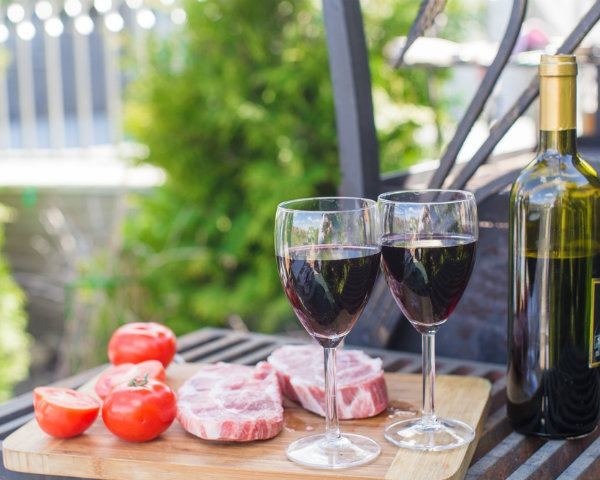5 Simple Rules For Wine And Barbecue Pairing
It is officially barbecue season! Time to dust off those grills and get cooking. If you do as much entertaining as we do during the summer, you are going to need a lot of wine.
Here's a short and sweet wine and barbecue pairing guide to get you through the summer, plus a more thorough wine list of Beautiful BBQ Wines. Not so coincidentally, these wines all have a little southern flair — and are either from southern Europe or the southern hemisphere. BBQ and the south just seem to go hand in hand!
Rule #1: Fresh Veggies Love Crisp, Dry Whites.
What is a barbecue without side dishes? One of the best things about summer is the produce. If you want to find a wine that will make fresh veggies shine, look to whites with crisp acidity, ripe fruit, and little-to-no residual sugar. One of our go-to salad wines is the Matua Sauvignon blanc. The wine's grassiness mirrors that of summer greens, and the citrus qualities can compliment delicate vinaigrettes. Grilling up some seasoned mixed vegetables? Try an exotic alternative to the typical patio pour, like Argentinian Torrontes Zuccardi Series A. Aromatic, herbal, and fragrant, Torrontes has the weight to stand up to something with a char.
Rule #2: Spanish Bubbles And Whites Go Great With Fish.
Pairing wine with grilled fish can be tough: the char on the flesh might call for a red, but the texture often calls for a white. The solution is a wine with lots of acidity, personality, and body. Spanish whites, like the Martín Códax Albariño, have all of the above. If the weather is unbearably hot and humid, you cannot beat the refreshing qualities of a bone dry Cava like Campo Viejo Cava brut the Jaume Serra Cristalino Brut. Plus, the citrus in these wines can act as that final squeeze of lemon on your fish dish.
Rule #3: Rosé Rocks With Pulled Pork And BBQ Chicken.
Rosés respect the delicacy of the meat, and still have enough guts to stand up to the sweet and sour tang of barbecue sauce. This is especially true for the Carolina style, mustard-and-vinegar-based barbecue sauces that are typically served with pulled pork; the sweet berry fruit and zesty acidity can dish it out and take it. If you are going sans sauce, check out a more delicate Provençal rosé like Chateau D'Esclans Whispering Angel.
Rule #4: Steak And Burgers Do Not Want The Same Wine.
We know what you are thinking: "They are both beef, what's the big deal?" Well, for starters let's talk toppings. One of the few wines that can handle the richness of beef and cheese, the sweetness of ketchup or barbecue sauce, the bite of mustard, and the saltiness of bacon is a silky Argentine Malbec like Miguel Gascón. The velvety tannins will have a field day with the proteins, while the rich fruit flavors will pair beautifully with a myriad of condiments.
Conversely, a well-prepared steak typically flies solo. Yes, it might be accompanied by the occasional bottle of steak sauce or a spoonful of marinade, but those are merely accessories. To enjoy the purity of flavor in your steak, stick with a Bordeaux or a Bordeaux-style blend, like the Santa Rita CCC. The astringency of the tannins acts as a palate cleanser between bites and they are softened by the protein and fattiness in the steak. The restrained dark fruit flavors and earthy, herbal aromas act as their own condiment.
Rule #5: Fight Fire with Fire.
There are actually a dozen different styles of barbecue sauce, all of which we love. The most well-known, however, is Kansas City BBQ: that sweet, sour and spicy sauce that sets every single one of our taste buds on fire. This dizzying array of flavors needs an equally complex wine to match. Something with lots of fruit, spice, and sass, like the Chapoutier Belleruche Côtes du Rhône Rouge. If the sauce in question is truly bold, look to the new world and try a Lodi Zinfandel or a red from Australia's McLaren Vale like Shingleback Shiraz.
Now go forth, use this guide, make us proud, and don't hesitate to invite us to your next BBQ. Or at least share some awesome pairings of your own below!
